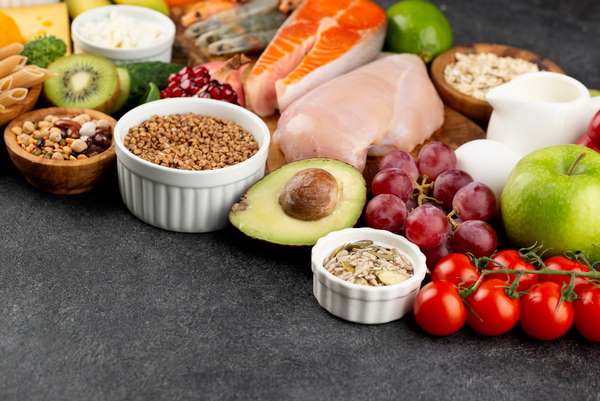Proteins and carbohydrates are macronutrients, meaning that they should be consumed in relatively large quantities every day to enable the body to function properly.

Two of the most common approaches to weight loss are low-carbohydrate and high-protein diets. In the former case, carbohydrates are restricted, while in the latter, protein intake exceeds the recommended dietary allowance (RDA).
According to scientific research, both types of diets can be effective in reducing body fat. But the question is: which is the best option for you?
What is the best diet for weight loss?
Both low-carbohydrate and high-protein approaches can help you lose weight. However, there is a limited amount of research that directly compares the two strategies.
One study found that increasing the amount of protein in the diet may be more important for weight loss than directly reducing carbohydrates. This study analysed several combinations of low-carbohydrate and high-protein diets:
- Normal protein and normal carbohydrate (NPNC),
- Normal protein and low carbohydrate (NPLC),
- High protein and normal carbohydrate (HPNC),
- High protein and low carbohydrate (HPLC).
Participants followed these diets for 12 months.
The results showed that diets with a higher protein content produced more pronounced weight loss results. The increased proportion of protein proved to be crucial not only for weight loss, but also for maintaining the results achieved.
Although further evidence is still lacking, preliminary findings suggest that increasing the protein content of your diet may be more effective in combating excess fat than simply restricting carbohydrates.

by @freepik
Effects of a low-carbohydrate diet
A low-carbohydrate diet is a diet that reduces the amount of carbohydrates in the diet. It is generally recommended to get 45-65% of your daily calories from carbohydrates. If your carbohydrate intake falls below 130 grams per day or is less than 26% of your total calories, you are considered to be on a low-carbohydrate diet.
There are different variants of low-carb diets. For example, a ketogenic diet (keto) may involve less than 50 grams of carbohydrates per day (generally below 10% of daily calorie intake), while other approaches may be more loyal to the amount of carbohydrates.
Scientists have confirmed that a low-carbohydrate diet can help you lose excess fat, as it has a positive effect on satiety and helps stabilise blood sugar levels after meals. These factors can generally reduce daily calorie intake, leading to weight loss.
One review found that for a period of 6-12 months, low-carb diets are more effective in terms of weight loss than low-fat diets.
In a more recent study, a 16-week low-carbohydrate diet (less than 130 grams of carbohydrates per day) showed better results in reducing body mass index (BMI) and waist circumference than a traditional Mediterranean diet in people with type 2 diabetes.
- Скільки разів б’ється серце за все життя? Вчені відповідають
- Здорові вуглеводи: як вибір продуктів впливає на ваше здоров’я
- 8 найкращих речей, які ви можете зробити для свого здоров’я у 50-60 років
At the same time, some studies indicate that low-carbohydrate protocols are not always superior to conventional calorie restriction in terms of effectiveness. One review showed minimal differences between a low-calorie diet and a relatively balanced diet with little carbohydrate restriction.

The effects of a high-protein diet
With a high-protein diet, a person receives more protein than the established recommended dietary allowance of 0.8 g per kilogram of body weight (or 0.36 g per pound). According to general advice, 10-35% of daily calories should come from protein.
High-protein diets typically refer to more than 1.2 g of protein per kilogram (approximately 0.54 g per pound) of body weight per day, which is well above the RDA.
The increased protein proportion aids in the weight loss process by slowing digestion and stimulating the synthesis of satiety hormones, which ultimately reduces overall calorie intake.
One systematic review found that diets with 18-59% protein were more successful at maintaining weight loss than control diets. On average, an increase in protein resulted in an additional weight loss of approximately 1.6 kg (3.5 lb).
In addition, a high-protein diet can help maintain muscle mass while losing weight, which helps maintain basal resting metabolic rate (RMR). According to a recent review, increasing protein in the menu has a positive effect on muscle maintenance in overweight or obese adults seeking to lose weight.
What if you combine low carbohydrate and high protein?
Many low-carbohydrate diets contain more protein than a standard diet because the reduction in carbohydrates is often compensated for by more protein. Thus, a low-carbohydrate, high-protein plan actually combines both mechanisms: reducing carbohydrates and increasing protein.
- Як звички допомагають зміцнити психічне здоров’я: поради
- Does coffee cause inflammation: studies have produced mixed results
- Побічні ефекти та правильне дозування мелатоніну: що потрібно знати
In one study, obese people who ate a diet of 30% carbohydrates, 30% protein and 40% fat for four weeks lost 58% more weight than participants who ate a Mediterranean-style diet of 55% carbohydrates, 15% protein and 30% fat.
Another study confirmed that a low-calorie, high-protein, reduced-carbohydrate diet (approximately 33% carbohydrate, 34% protein, and 30% fat) over nine months provided better weight loss in obese people than a low-calorie diet of 53% carbohydrate, 20% protein, and 27% fat.
This highlights that a lower percentage of carbohydrates combined with a higher protein component can accelerate weight loss.

by @jruiz1708
How to choose the best diet for yourself?
Both low-carbohydrate and high-protein diets can have a positive impact on weight loss. However, you should take into account your personal needs, medical conditions and taste preferences.
Both types of diet are quite flexible. If you are looking to improve your body weight and control your blood sugar levels at the same time, a low-carbohydrate diet with a high protein and fat content may be a good choice.
If you want to focus on maintaining or building muscle while losing weight, a high-protein diet may be more appropriate.
Restrictive approaches such as the ketogenic diet (with strictly regulated macronutrient ratios) may work well for people with diabetes or obesity, but they are not necessary for everyone.
If you are in doubt about choosing a particular direction, it is better to consult a specialist, such as a nutritionist. He or she will help you develop a meal plan – low-carb or high-protein – tailored to your needs.
Both high-protein and low-carbohydrate diets can be effective for weight loss. However, according to some studies, increasing the proportion of protein may play the greatest role in reducing fat.
If you need help choosing or developing a diet plan, consult a healthcare professional who can help you create a safe and effective diet based on your goals and health needs.
This article is intended for informational purposes only and should not be considered a substitute for advice provided by a qualified healthcare professional.






